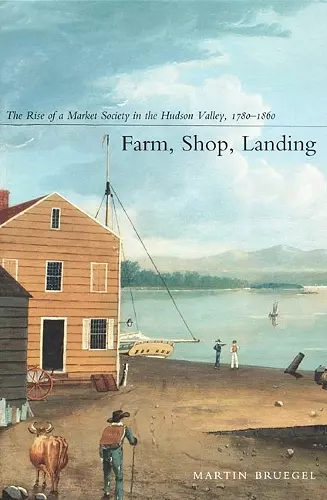Farm, Shop, Landing
The Rise of a Market Society in the Hudson Valley, 1780–1860
Format:Hardback
Publisher:Duke University Press
Published:24th Apr '02
Currently unavailable, and unfortunately no date known when it will be back

At the turn of the nineteenth century, when the word “capital” first found its way into the vocabulary of mid-Hudson Valley residents, the term irrevocably marked the profound change that had transformed the region from an inward-looking, rural community into a participant in an emerging market economy. In Farm, Shop, Landing Martin Bruegel turns his attention to the daily lives of merchants, artisans, and farmers who lived and worked along the Hudson River in the decades following the American Revolution to explain how the seeds of capitalism were spread on rural U.S. soil.
Combining theoretical rigor with extensive archival research, Bruegel’s account diverges from other historiographies of nineteenth-century economic development. It challenges the assumption that the coexistence of long-distance trade, private property, and entrepreneurial activity lead to one inescapable outcome: a market economy either wholeheartedly embraced or entirely rejected by its members. When Bruegel tells the story of farmer William Coventry struggling in the face of bad harvests, widow Mary Livingston battling her tenants, blacksmith Samuel Fowks perfecting the cast-iron plough, and Hannah Bushnell sending her butter to market, Bruegel shows that the social conventions of a particular community, and the real struggles and hopes of individuals, actively mold the evolving economic order. Ultimately, then, Farm, Shop, Landing suggests that the process of modernization must be understood as the result of the simultaneous and often contentious interplay of social and economic spheres.
“This is an extremely well-researched and sophisticated contribution to American rural history. Bruegel has written a detailed local study on the development of the Hudson River Valley, which has important methodological and interpretive implications for many other regions and fields.”— Peter Coclanis, University of North Carolina, Chapel Hill
“This is an outstanding work. In an era where so many historians are focusing on smaller and smaller subjects, it is a pleasure to read a book that directly tackles the big picture. Indeed, it is something close to a histoire totale. It not only addresses a topic of extraordinary importance but does so with theoretical sophistication and remarkable research.”—Richard Stott, George Washington University
"An outstanding environmental history. . . . A deeply researched, tightly argued, and nicely written study. The book is both an important scholarly monograph and a fine paperback addition to reading lists for advanced undergraduate and graduate-level history courses." -- James A. Henretta * American Historical Review *
"Bruegel adds notably to our understanding of how and why a new way of life came about in the two generations following the American Revolution. His account deserves attention from all historians interested in understanding how, in concrete terms, social change came about and was experienced." -- Christopher Clark * Journal of Social History *
ISBN: 9780822328353
Dimensions: unknown
Weight: 816g
320 pages